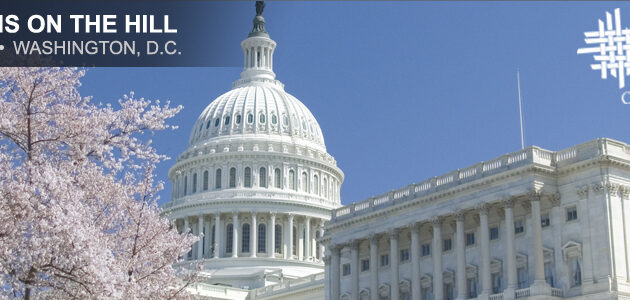Earlier this month a group of foundation leaders from New Jersey traveled to Washington as part of Foundations on the Hill. Our message was simple: do no harm to charitable giving and use the philanthropic community as a resource for expertise and perspective. The timing for our visit was particularly interesting given that Chairman Camp of the House Ways & Means Committee had released his massive tax reform proposal the week before and President Obama had put forth his proposed budget the day before. Not surprisingly, both were big topics of conversation.
We were fortunate to meet with most of New Jersey’s Congressional and Senate offices where we heard over and over again that we don’t need to worry too much about any major tax reform moving forward this year. Dead on arrival is how more than one office described the proposal. This was reassuring given how much harm some ideas contained in Chairman Camp’s plan could inflict on the entire charitable sector.
Now this doesn’t mean that those of us who care deeply about ensuring we have a vibrant nonprofit sector in place can sit back and rest on our laurels. Frankly, there are a few “ideas” included in the Chairman’s recommendations that could be peeled off and proposed for action in other ways, separate from any major tax reform umbrella. And, there are always ideas percolating at the state level, often influenced by proposals at the federal level.
But hearing that we needn’t worry too much enabled our foundation leaders to talk about the work they are investing in and how their grants make a difference in communities throughout our state. For instance, Doug Schoenberger of Verizon Foundation shared how the company’s commitment to supporting victims of domestic violence meant ramping up its grantmaking in the wake of Hurricane Sandy, knowing the added stress can mean an uptick in incidents. From early childhood education and childhood obesity to mental health services and workforce development the funding community our foundation colleagues shared stories of meaningful impact.
While in Washington, we had the opportunity to also hear from President of the National Council of Nonprofits Tim Delaney, the always passionate, highly articulate advocate for our country’s nonprofit sector. NCN is the national association working directly with our colleagues at the Center for Non-Profits. Tim did a masterful job of illustrating that the most seriously significant policy and legislative proposals affecting our field nationally are actually happening at the state level. Then he shared this amazing bit of information: while Congress passed fewer than 80 laws in 2013 (including some naming post offices) state legislatures adopted almost 40,000. According to Tim, informed policy practitioners see the arc of history being written now at that state level. You can read more of Tim’s sage advice and insights in this piece Foundations can Rewrite History by Focusing on the States from the Nonprofit Quarterly. Here are some of the highlights:
Taxes, Fees and PILOTS: Right now, more than a dozen states have live proposals to impose or authorize new taxes, fees, or demands for payments in lieu of taxes (PILOTS) on charitable nonprofits.
Government Contracting Reform: According to the Urban Institute, about a third of the nonprofit sector’s revenues come from government contracts and grants as opposed to about 2% from foundations. When governments fail to pay the full costs, or pay late, or impose wasteful application or reporting conditions and costs, it means that foundations are being forced to subsidize government – again. (Be sure to check out NCN’s A Dozen Common Sense Solutions to Government-Nonprofit Contracting Problems)
Nonprofit Independence: state legislative proposals to dictate or curb compensation levels, impose excessive and burdensome reporting requirements (that are not also demanded of for-profit businesses), and apply open meeting and public records laws designed for government.
Tim offered a couple of very specific recommendations for the foundation community, but these ideas are also very important for all social sector organizations –
- Be data driven – the real policy action is in the states.
- Take the road less traveled…focus on state policy and in doing so develop the capacity of grantees to engage on federal policy matters when opportunities arise.
- Join your regional association of grantmakers (I loved this message of course).
- Support your state association of nonprofits i.e. Center for Non-Profits here in New Jersey ( I loved this message as well since my organization, the Council of New Jersey Grantmakers, is one.)
We all need to be having conversations about these issues with our boards and our members. Not only does the social sector work to improve our communities and solve a vast array of problems, it is a major economic driver – employing nearly 10% of workforce. We cannot sit back and let others define the nonprofit business model. We need to be a part of the conversation, and that starts with paying attention and working at the state level.
Nina Stack is President of the Council of New Jersey Grantmakers, the statewide association of more than 120 funding organizations working in New Jersey. She also serves as Chair of the Forum of Regional Associations of Grantmakers, a 34-member network serving more than 4,000 foundations, corporations and other donors across the country.

